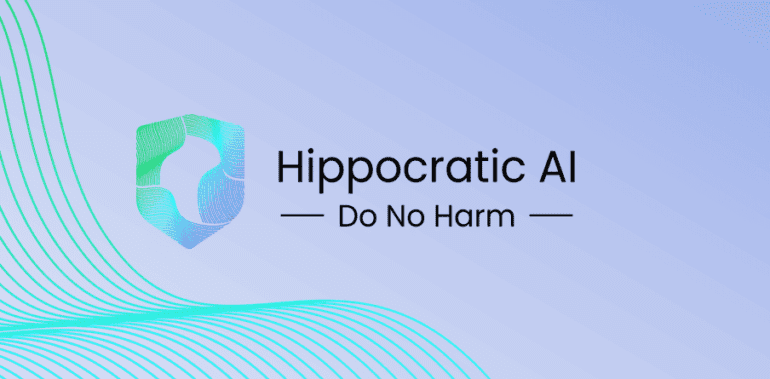- Hippocratic AI initiates beta testing for the first generative AI-driven healthcare provider.
- Over 40 leading healthcare entities participate, including Memorial Hermann, University of Vermont Health Network, Fraser Health, and Side Health.
- Focus on safety-centric Large Language Model (LLM) for voice-based, patient-facing, non-diagnostic applications.
- The company’s LLM surpasses GPT-4 in 100+ healthcare certifications, emphasizing healthcare-specific training and reinforcement learning.
- Testing prioritizes chronic care management, post-discharge follow-ups, wellness surveys, and health risk assessments.
- Evaluation criteria include conversational ability, medical accuracy, script adherence, empathy, and listening skills.
- Frontline healthcare professionals lead internal testing to ensure safety and efficacy.
- Collaboration extends to Founding Partners, Early Access Partners, Physician Advisory Council, and Nurse Advisory Council.
Main AI News:
Hippocratic AI heralds the commencement of beta testing for the world’s premier generative AI-fueled healthcare provider, leveraging the company’s safety-centric Large Language Model (LLM) tailored for healthcare. Initially focusing on voice-oriented, patient-centric, non-diagnostic applications, the endeavor has garnered participation from over 40 provider groups, health systems, and digital health enterprises. Among these pioneers are Memorial Hermann Health System, University of Vermont Health Network, Fraser Health, and Side Health, each committed to a stringent internal vetting process ensuring the safety and efficacy of the offerings prior to market release.
Innovating the inaugural safety-centric LLM for the healthcare sector, Hippocratic AI has already surpassed GPT-4 across more than 100 healthcare certifications. This achievement stems from its specialized training in healthcare vernacular and its prioritization of reinforcement learning with human feedback (RLHF), facilitated by healthcare professionals.
“Generative AI possesses immense potential to revolutionize healthcare access, equity, and outcomes, yet its impact has predominantly resided in back-office functionalities. At Hippocratic AI, we advocate for a loftier aspiration within the industry,” remarked Munjal Shah, co-founder and CEO of Hippocratic AI. “Our mission extends beyond mitigating existing staffing deficits; we aspire to usher in an era of abundant healthcare. Envision a world where every individual enjoys boundless access to safe, tailored care. Our partners play an instrumental role in realizing this vision through internal technology trials and safety validation.”
Beta testing collaborators have delineated several critical expert workflows for initial scrutiny, aiming to ensure precision and safety. These encompass chronic care management, post-discharge follow-ups for conditions like congestive heart failure and kidney disease, as well as wellness surveys and assessments of social determinants of health. In collaboration with partners, Hippocratic AI pledges to expand its repertoire of conditions and develop supplementary products and workflows over time.
“We perceive this technology as a remedy for workforce shortages, as it assumes rudimentary tasks to bolster workflow support. For instance, providing pre-operative instructions or conducting post-discharge checkups,” affirmed Feby Abraham, Ph.D., executive vice president and chief strategy and innovations officer for Memorial Hermann. “Amidst evolving challenges, innovation remains imperative in enhancing employee engagement and support.“
Frontline healthcare professionals, including physicians and nurses, will spearhead internal testing processes within each partnering health system or enterprise. Assessments will scrutinize conversational proficiency, medical accuracy, script adherence, empathy, and listening acumen. Testing partners will gain insights into product performance across all participants, evaluation hours per product, specific issues addressed, and resolution of feedback submitted.
This beta testing phase represents the pinnacle of Hippocratic AI’s collaborative efforts within the industry, following the establishment of the company’s Founding Partners, Early Access Partners, Physician Advisory Council, and Nurse Advisory Council. These esteemed providers will gain access to initial products and workflows for internal testing, shaping the evolution of Hippocratic AI’s LLM to maximize safety and effectiveness.
“We eagerly join forces with Hippocratic AI in this beta testing phase. While patients may not yet interact with the technology, our clinical staff stands to glean insights into generative AI’s potential for enhancing care delivery, while ensuring its efficacy, efficiency, and safety for patients nationwide,” shared Jessica Moschella, Senior VP for High Value Care at The University of Vermont Health Network. “As a rural healthcare provider, we take pride in leading the charge for rural health care, fostering innovation to address unique patient needs and diminish health disparities.”
“At Side Health, we recognize that patient engagement and education are pivotal to achieving better health outcomes,” stated Dr. Kanwar Kelley, CEO and Co-Founder of Side Health. “Generative AI offers an unprecedented opportunity to engage our patients on a vast scale, providing continuous outreach and education between provider visits, while enhancing our capacity to manage chronic conditions through remote monitoring and clinical services. We eagerly collaborate with Hippocratic AI to ensure the safety and efficacy of the AI tools under development.”
Conclusion:
Hippocratic AI’s beta testing initiative marks a significant step towards revolutionizing healthcare delivery through generative AI solutions. The emphasis on safety, efficacy, and collaboration underscores the company’s commitment to addressing critical challenges in the healthcare market. As the initiative progresses, it is poised to set new standards for patient care and workforce optimization, driving transformative change across the industry.

